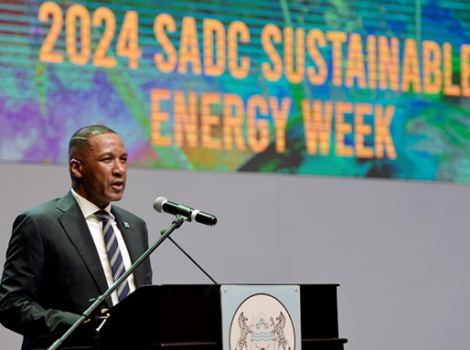
30 March 2025
President Duma Boko last week announced that water tariffs for households will be cut by 30%, while those for government will be increased by 40%, in an effort to lower cost of living and economic pressures facing households in the country.
Speaking at a press briefing on Thursday, Boko stated that the decision was taken to ensure that ordinary citizens have access to affordable water while government institutions shoulder a larger share of the costs.
“We are looking at making it easier for households to survive,” he said. “At the same time, government agencies must play their part in ensuring sustainability by paying more for their usage.”
The Water Utilities Corporation (WUC), the state-owned water supplier, has been struggling with mounting debts, as it is owed millions of pula by consumers, including businesses and government departments. The Corporation has faced financial strains due to unpaid bills, affecting its ability to maintain and upgrade water infrastructure.
This month, a memo leaked from within the WUC showed that its employees will be paid their salaries late. Some economic analysts have expressed concerns about how WUC will manage its financial health in light of the latest changes. With reduced revenue from citizens and an increase in government water tariffs, there is uncertainty about whether the measures will bridge the gap or further strain the Corporation’s finances.
Consumers will be better off with reduced water costs, as the move is expected to put more money in their pockets. By contrast, government departments and agencies will now have to adjust their budgets to accommodate higher water rates, which may impact spending in other areas.
As WUC continues to navigate its financial challenges, it remains to be seen whether the new pricing model will help stabilise the water supply sector or add further pressure to an already struggling utility provider. The government has yet to outline how it will assist WUC in recovering the millions owed or whether additional measures will be introduced to ensure sustainability.
WUC has previously received bailouts from government while its major projects are guaranteed by the state in arrangements with external financiers. The impact of the latest move on inflation is presently unclear. In a commentary recently, researchers at Econsult said while inflation was currently benign, there were worrying indicators beneath the figures.
“One concern is that the main inflationary pressures are now being generated domestically, with inflation for domestic tradeables, which are mostly commodities with broadly market-determined prices, rather than regulated prices at 4.3% in March, meaning that there are mainly domestic, rather than external, inflationary pressures,” the researchers stated.
In addition, Econsult researchers said inflation was being kept artificially low as some administered prices such as fuel and electricity were not being adjusted to reflect the true costs of supply or production.
“For instance, the domestic price of petrol has lagged rising global fuel prices, requiring subsidies from the National Petroleum Fund.
“The regulated price of electricity is also well below the cost of production (and is also exceptionally low by international standards), requiring huge tariff subsidies to Botswana Power Corporation from the budget,” the researchers stated.
Source: https://rb.gy/043ahx



